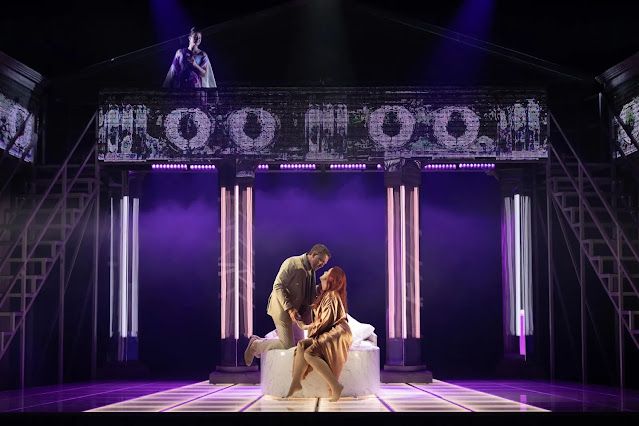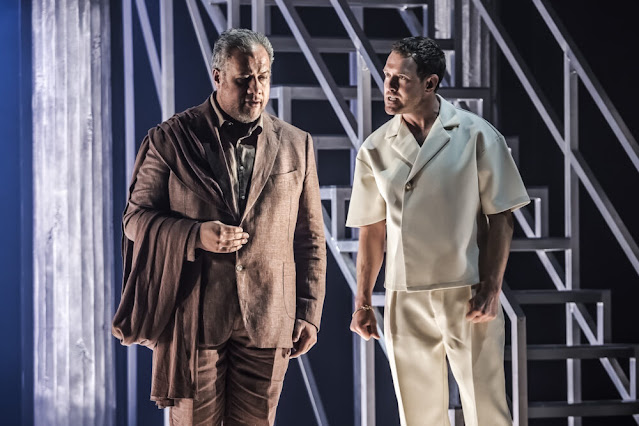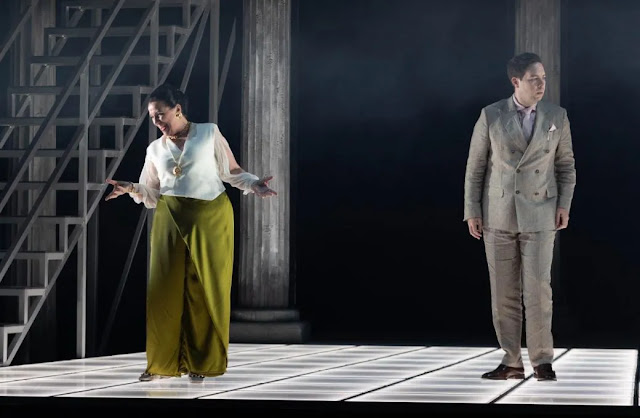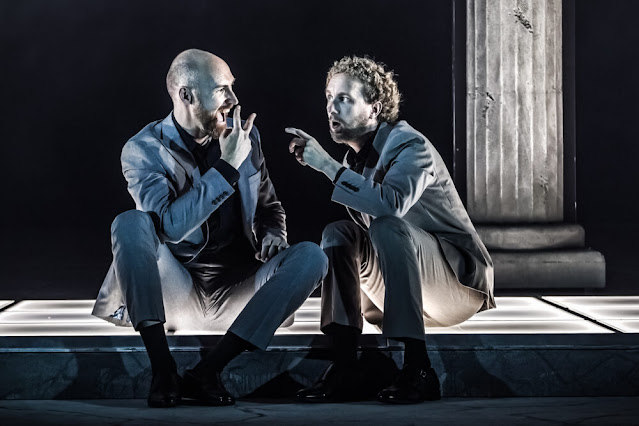 |
| Monteverdi: L’incoronazione di Poppea – Vanessa Waldhart, Kitty Whately, Sam Furness – The Grange Festival (Photo: Craig Fuller) |
Monteverdi: L’;incoronazio di Poppea; Kitty Whately, Sam Furness, Christopher Lowrey, Anna Bonitatibus, Jonathan Lemalu, directed: Walter Sutcliffe, La Nuova Musica, David Bates; The Grange Festival
Reviewed 22 June 2024
A serious exploration of love triumphant amidst fallible characters in a production that focused on individuals and brought a rich depth of characterisation and refocusing to Monteverdi’s opera
Monteverdi’s L’incoronazione di Poppea exists in a state that gives directors and music directors great creative freedom. With no definitive composer’s manuscript, scores surviving for later performances and an early libretto, none of which quite present the same version, and a score itself with a bare minimum of information, there are plenty of decisions to be made.
The work was premiered in Venice in 1643 in a tiny theatre as part of Venice’s burgeoning commercial theatre scene. Though the opera’s only surviving scores date from the 1650s, that first performance seems to have had around a whopping 28 roles played by a cast of around 11 which entailed some pretty radical doubling; one putative cast list has the same singer doubling Virtu, Ottavia and Drusilla. This version alternates tragedy and comedy, teeming with life in a way that would typify the Venetian opera of the late 17th and early 18th centuries, written for the commercial opera house rather than an aristocratic or royal patron. I suspect that the work’s extensive recitatives would have been delivered at a rattling rate, this would have been a terrific show.
At the Grange Festival on Saturday 22 June 2023 we caught the last night of Walter Sutcliffe‘s production of Monteverdi’s L’Incoronazione di Poppea [Sutcliffe, the former artistic director of Northern Ireland Opera, is artistic director of Halle Opera, and directed Handel’s Agrippina at the Grange in 2018, see my review]. La nuova musica was in the pit, directed from the harpsichord by David Bates. Kitty Whately was Poppea, Sam Furness was Nerone, Christopher Lowrey was Ottone, Jonathan Lemalu was Seneca, Anna Bonitatibus was Ottavia, Vanessa Waldhart was Drusilla, Frances Gregory was Arnalta, with Gwilym Bowen, Jorge Navarro Colorado and Armand Rabot. Designs were by Jon Bausor.
 |
| Monteverdi: L’incoronazione di Poppea – Jonathan Lemalu, , Sam Furness – The Grange Festival (Photo: Craig Fuller) |
The version used was one with the Prologue for Fortuna, Amore and Virtu (Kitty Whately, Vanessa Waldhart and Anna Bonitatibus) but without the interventions of the gods or all the extra servants, so no Valetto threatening to burn Seneca’s beard. It was a very serious approach, so the comic elements on the scenes with the older women, Arnalta and Nutrice, was played down. As Arnalta, Frances Gregory’s suave PA was a long was from Alexander Oliver’s masterful balance of comedy and tragedy in the role.
Sutcliffe’s focus meant that we lost this balance, the tragedy was never lightened and the drama of these horrible people simply played out. But Sutcliffe understood their foibles, and this was a very human production.
Bausor’s flexible set evoked Rome but had modern elements too, the twin focuses being a portico (designed using elements of the Grange itself) which doubled as catwalk so Anna Bonitatibus’ Ottavia looked down on her rival’s triumph, and a bed that doubled as Seneca’s bath.
There was no feel of the wider court, of who these people were, and Sam Furness’ costumes as Nerone were alarmingly casual, certainly not as stylish as those of the female characters. The chorus in Seneca’s death scene was off-stage and there was no sense of a coronation at the end of the opera. In the pit, David Bates took a similarly measured approach, eschewing technicolour dazzle with an instrumental ensemble featuring just five strings, gamba, lirone, cornett doubling recorder, two harpsichords, two triple harps and three theorbos.
That brings us to the elephant in the room. If this had been an opera by Mozart of Handel, there would have been some significant note taken that the role of Nerone had been transposed down an octave and transferred to a tenor; something that would no longer be considered for roles like Cherubino or Giulio Cesare. This meant that Poppea and Nerone’s voices sat in different registers and no longer intertwined magically. Nerone sits high for a countertenor (it was written for a soprano castrato and is firmly in mezzo-soprano territory) but low for a tenor.
Sam Furness, singing in territory he rarely visits (recent roles include Canio in Cavalleria Rusticana, Albert Gregor in The Makropoulos Case and Tebaldo in I Capuletti e i Montecchi), gave a fine, subtle performance, producing some lovely mezza-voce and spinning out high notes. It might have not been quite what I wanted in this role, but oh boy was it good. And his Nerone was quite a balanced chap, with few of the neuroses and viciousness (this can particularly come if sung by a countertenor as parts of the role sit high). Yet it was a performance that drew the character as portrayed in the libretto. If you read this, then Nerone is not particularly vicious, only Seneca dies and the others are banished. It is the other characters who are murderous.
As a mezzo-soprano, Kitty Whately also brought a refocusing to Poppea. The role lay easily in her vocal compass but the voice’s centre of gravity and Whately’s demeanour gave Poppea a greater sense of balance and experience. She was still very sexy, but less the perky soubrette, creating something more languorous. This Poppea felt less like a gold digger and the creamy luxury of Whately’s voice made Poppea sound well upholstered. The duets with Sam Furness’ Nerone really did tingle, and that they stripped down and got into bed during the final duet felt inevitable.
 |
| Monteverdi: L’incoronazione di Poppea – Anna Bonitatibus, Christopher Lowrey – The Grange Festival (Photo: Craig Fuller) |
Anna Bonitatibus’ Ottavia veered towards the dignified Roman matron rather than vicious schemer, the role can go either way. She was dignified yet moving, as she made her way out of Nerone’s life, giving great dignity to Ottavia’s emotions yet intensity tool. there was a moving melancholy to her scenes and even the ‘kill Claudio’ moment had a certain lofty logic to it, lacking monstrousness. This was a richly layered performance and it was very moving the way, after her final scene, she walked in a dignified manner across the stage and up onto the catwalk, spending the rest of the opera observing Poppea and Nerone’s love making.
Christopher Lowrey’s Ottone was less wimpish than usual. Strongly sung and not entirely sympathetic, he was happy to force his way onto Vanessa Waldhart’s Drusilla, and his assumption of Ottavia’s revenge fantasy was completely dead pan and down to earth. Waldhart spent a lot of time as Amore, watching over proceedings and this shaded into her performance as a very sympathetic Drusilla, focused and intent.
Jonathan Lemalu was a sober Seneca, thoughtful and less bleak, less black of voice than some. Lemalu’s warm tones made Seneca’s death scene rather touching, though the earlier scene with Furness’ Nerone seemed to be more debate and did not quite crackled with energy.
 |
| Monteverdi: L’incoronazione di Poppea – Jorge Navarro Colorado, Gwilym Bowen – The Grange Festival (Photo: Craig Fuller) |
Frances Gregory was a poised Arnalta, characterful and business-like, her advice to Poppea down to earth, her lullaby rather lovely. Fiona Kim was wonderfully characterful as Nutrice, at time positively gleeful. Jorge Navarro Colorado and Gwilym Bowen were rather luxury casting in the tenor roles, giving the soldiers’ opening scene a crackle of authenticity, and Navarro Colorado was similarly impressive and dignified when delivering Nerone’s message to Seneca. You wished there had been more for him to do. As Lucano, Bowen’s scene with Furness’ Nerone also helped refocus our view of Nerone. Their thrilling duet became a cocaine filled binge that ended with a kiss and more. Bowen’s Lucano certainly not unwilling, it made you realise that this Nerone wasn’t just open to chasing anything in a skirt. Armand Rabot made a strong contribution in his scene as Littore.
L’incoronazione di Poppea is a long opera, full of dialogue which creates a rich picture. Lacking the light and shade of the original alternation of tragedy and comedy, and without any sense of wider context, the focus was on a series of dialogues and the long first half (one hour and forty minutes) threatened to sag at times. But the ensemble brought off Sutcliffe’s vision, brilliantly giving us an absorbing portrait of love triumphant.
Never miss out on future posts by following us
The blog is free, but I’d be delighted if you were to show your appreciation by buying me a coffee.
Elsewhere on this blog
- The Sea and Ships: the London Song Festival celebrates the first Shipping Forecast to be broadcast on British radio – concert review
- Much more than a piece of history: Roderick Cox conducts Shostakovich’s Symphony No. 10 at the Royal Academy of Music – concert review
- Music like no other: Icelandic composer Gudmundur Steinn Gunnarsson’s Stífluhringurinn – record review
- New colours in old sound worlds: the Portuguese duo, Bruno Monteiro & João Paulo Santos in Elgar, Debussy, Ravel & more – record review
- Time remembered: the 75th edition of the Aldeburgh Festival lovingly recreates the opening night of 1948 Festival – concert review
- A disc that makes you think, but also satisfies as a recital in its own right: Songs for Peter Pears from Robin Tritschler & friends – record review
- Second view: Anna Patalong makes her role debut as Puccini’s Tosca at Opera Holland Park – opera review
- An undeniable gift for melody: Charles Mauleverer’s Overture – record review
- The 75th edition of the Aldeburgh Festival gets off to a good, spirited and proud start – concert review
- The Devil’s Den: I chat to composer Isabella Gellis & conductor Finnegan Downie Dear about the new opera Shadwell Opera is presenting at the Nevill Holt Festival – interview
- Home









